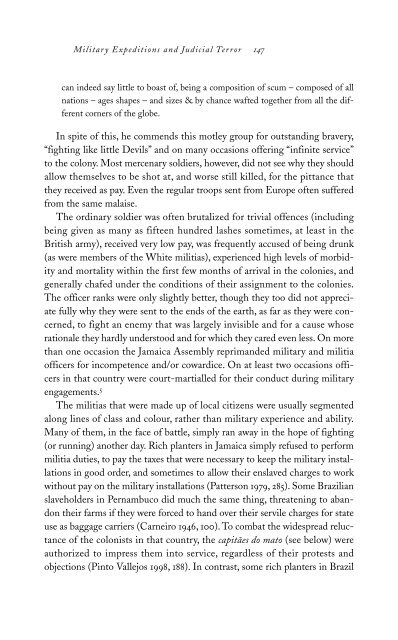60199616-flight-to-freedom-african-runaways-and-maroons-in-the-americas
60199616-flight-to-freedom-african-runaways-and-maroons-in-the-americas
60199616-flight-to-freedom-african-runaways-and-maroons-in-the-americas
Create successful ePaper yourself
Turn your PDF publications into a flip-book with our unique Google optimized e-Paper software.
Military Expeditions <strong>and</strong> Judicial Terror<br />
147<br />
can <strong>in</strong>deed say little <strong>to</strong> boast of, be<strong>in</strong>g a composition of scum – composed of all<br />
nations – ages shapes – <strong>and</strong> sizes & by chance wafted <strong>to</strong>ge<strong>the</strong>r from all <strong>the</strong> different<br />
corners of <strong>the</strong> globe.<br />
In spite of this, he commends this motley group for outst<strong>and</strong><strong>in</strong>g bravery,<br />
“fight<strong>in</strong>g like little Devils” <strong>and</strong> on many occasions offer<strong>in</strong>g “<strong>in</strong>f<strong>in</strong>ite service”<br />
<strong>to</strong> <strong>the</strong> colony. Most mercenary soldiers, however, did not see why <strong>the</strong>y should<br />
allow <strong>the</strong>mselves <strong>to</strong> be shot at, <strong>and</strong> worse still killed, for <strong>the</strong> pittance that<br />
<strong>the</strong>y received as pay. Even <strong>the</strong> regular troops sent from Europe often suffered<br />
from <strong>the</strong> same malaise.<br />
The ord<strong>in</strong>ary soldier was often brutalized for trivial offences (<strong>in</strong>clud<strong>in</strong>g<br />
be<strong>in</strong>g given as many as fifteen hundred lashes sometimes, at least <strong>in</strong> <strong>the</strong><br />
British army), received very low pay, was frequently accused of be<strong>in</strong>g drunk<br />
(as were members of <strong>the</strong> White militias), experienced high levels of morbidity<br />
<strong>and</strong> mortality with<strong>in</strong> <strong>the</strong> first few months of arrival <strong>in</strong> <strong>the</strong> colonies, <strong>and</strong><br />
generally chafed under <strong>the</strong> conditions of <strong>the</strong>ir assignment <strong>to</strong> <strong>the</strong> colonies.<br />
The officer ranks were only slightly better, though <strong>the</strong>y <strong>to</strong>o did not appreciate<br />
fully why <strong>the</strong>y were sent <strong>to</strong> <strong>the</strong> ends of <strong>the</strong> earth, as far as <strong>the</strong>y were concerned,<br />
<strong>to</strong> fight an enemy that was largely <strong>in</strong>visible <strong>and</strong> for a cause whose<br />
rationale <strong>the</strong>y hardly unders<strong>to</strong>od <strong>and</strong> for which <strong>the</strong>y cared even less. On more<br />
than one occasion <strong>the</strong> Jamaica Assembly reprim<strong>and</strong>ed military <strong>and</strong> militia<br />
officers for <strong>in</strong>competence <strong>and</strong>/or cowardice. On at least two occasions officers<br />
<strong>in</strong> that country were court-martialled for <strong>the</strong>ir conduct dur<strong>in</strong>g military<br />
engagements. 5<br />
The militias that were made up of local citizens were usually segmented<br />
along l<strong>in</strong>es of class <strong>and</strong> colour, ra<strong>the</strong>r than military experience <strong>and</strong> ability.<br />
Many of <strong>the</strong>m, <strong>in</strong> <strong>the</strong> face of battle, simply ran away <strong>in</strong> <strong>the</strong> hope of fight<strong>in</strong>g<br />
(or runn<strong>in</strong>g) ano<strong>the</strong>r day. Rich planters <strong>in</strong> Jamaica simply refused <strong>to</strong> perform<br />
militia duties, <strong>to</strong> pay <strong>the</strong> taxes that were necessary <strong>to</strong> keep <strong>the</strong> military <strong>in</strong>stallations<br />
<strong>in</strong> good order, <strong>and</strong> sometimes <strong>to</strong> allow <strong>the</strong>ir enslaved charges <strong>to</strong> work<br />
without pay on <strong>the</strong> military <strong>in</strong>stallations (Patterson 1979, 285). Some Brazilian<br />
slaveholders <strong>in</strong> Pernambuco did much <strong>the</strong> same th<strong>in</strong>g, threaten<strong>in</strong>g <strong>to</strong> ab<strong>and</strong>on<br />
<strong>the</strong>ir farms if <strong>the</strong>y were forced <strong>to</strong> h<strong>and</strong> over <strong>the</strong>ir servile charges for state<br />
use as baggage carriers (Carneiro 1946, 100). To combat <strong>the</strong> widespread reluctance<br />
of <strong>the</strong> colonists <strong>in</strong> that country, <strong>the</strong> capitães do ma<strong>to</strong> (see below) were<br />
authorized <strong>to</strong> impress <strong>the</strong>m <strong>in</strong><strong>to</strong> service, regardless of <strong>the</strong>ir protests <strong>and</strong><br />
objections (P<strong>in</strong><strong>to</strong> Vallejos 1998, 188). In contrast, some rich planters <strong>in</strong> Brazil


